18+ SAMPLE Real Estate Purchase Contract
-
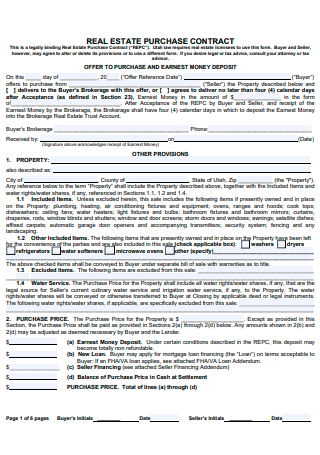
Real Estate Purchase Contract Template
download now -
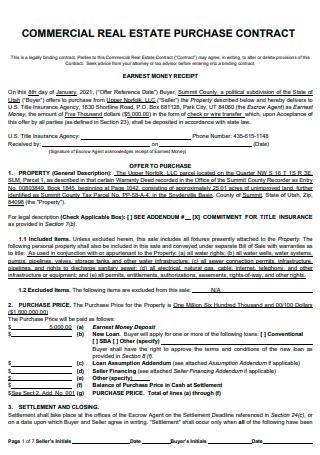
Commercial Real Estate Purchase Contract
download now -
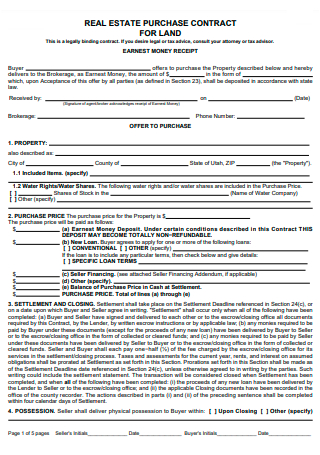
Real Estate Purchase Contract For Land
download now -

Real Estate Purchase Contract in PDF
download now -
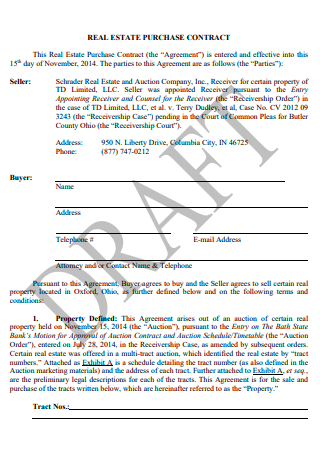
Draft Real Estate Purchase Contract
download now -
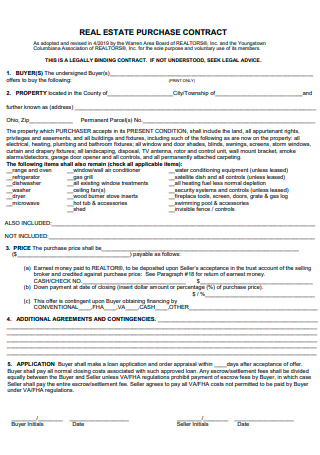
Basic Real Estate Purchase Contract
download now -
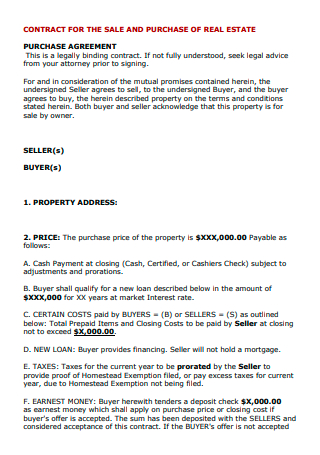
Real Estate Purchase and Sale Contract
download now -
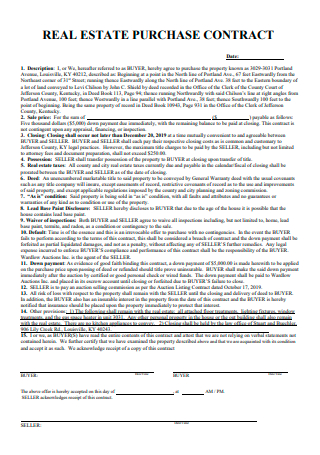
Standard Real Estate Purchase Contract
download now -
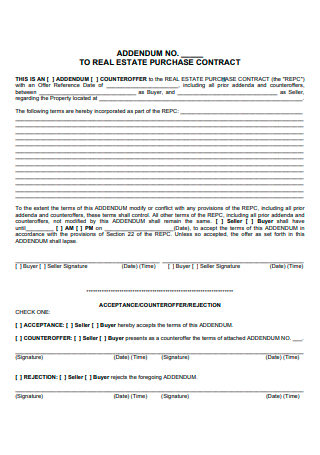
Real Estate Purchase Contract Addendum
download now -
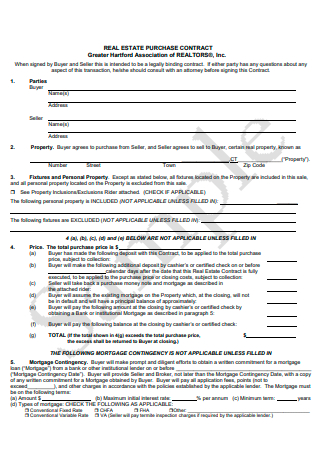
Sample Real Estate Purchase Contract
download now -
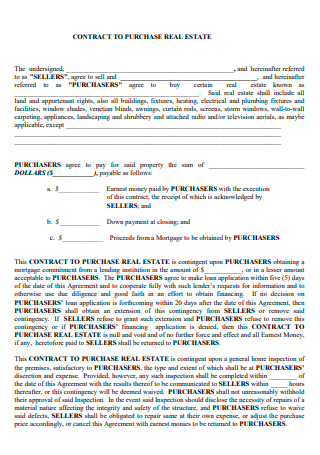
Real Estate Purchase Contract Example
download now -
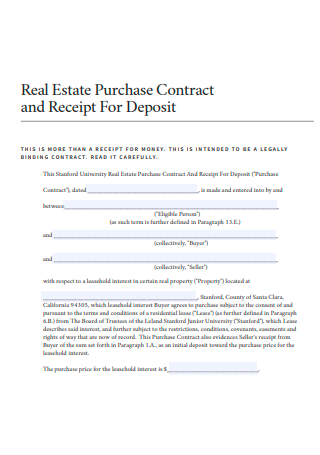
Real Estate Purchase Contract and Receipt For Deposit
download now -
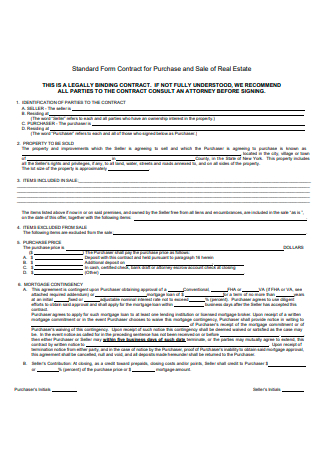
Standard Form Real Estate Purchase and Sale Contract
download now -
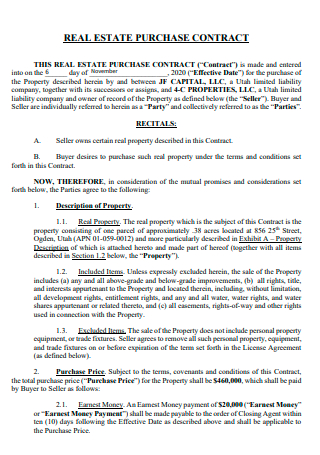
Real Estate Purchase Contract Format
download now -
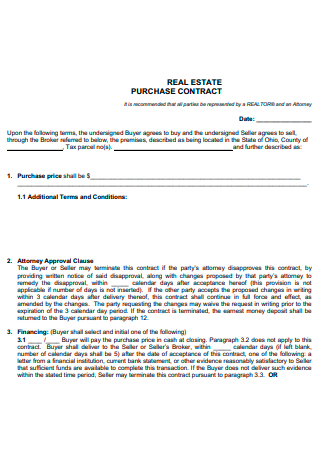
Printable Real Estate Purchase Contract
download now -
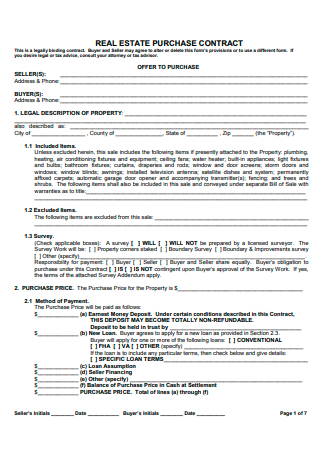
Real Estate Offer to Purchase Contract
download now -
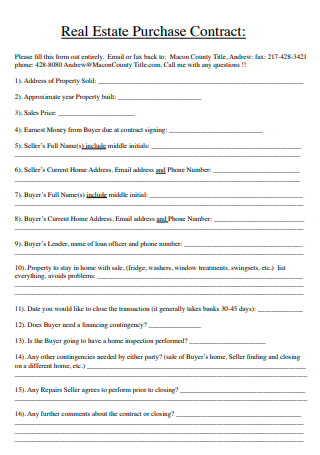
Real Estate Purchase Contract Form
download now -
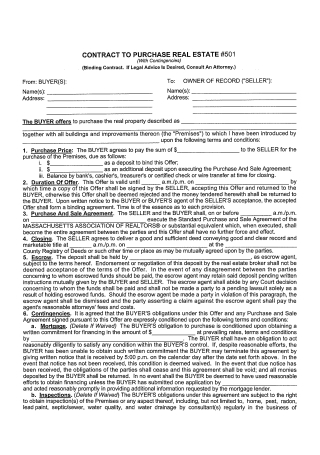
Formal Real Estate Purchase Contract
download now -
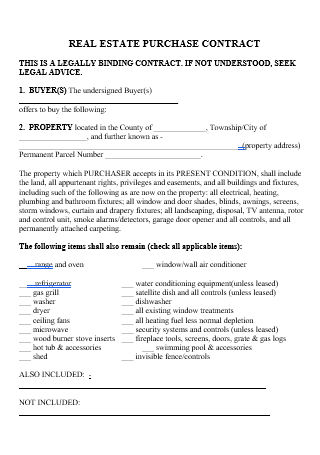
Real Estate Purchase Contract in DOC
download now
FREE Real Estate Purchase Contract s to Download
18+ SAMPLE Real Estate Purchase Contract
What Is a Real Estate Purchase Contract?
When Is a Contract Valid?
What Is the Primary Purpose of a Real Estate Purchase Contract?
What Are Some Mistakes to Avoid in a Real Estate Purchase Contract
Elements of a Real Estate Purchase Contract
How to Write a Real Estate Purchase Contract
What do you need to know about real estate option contracts?
What are the clauses in a real estate contract?
How does an assignment contract work for real estate?
What Is a Real Estate Purchase Contract?
Generally speaking, a real estate purchase contract is a legally enforceable agreement that is made between two parties to transfer ownership of a home or other property. It is required that both parties have legal ability to enter into a contract for the purchase, exchange, or other transfer of the real estate in issue and that the contract is based on a legal consideration, which is whatever is being exchanged for the real estate in question. A certain quantity of money is nearly always required, but consideration might also include other property or a promise to pay a specific amount of money in the future.
Other templates are available on our website, and you can use them whenever you need them. They are as follows: business proposal, buy-sell agreement, property purchase agreement, sample home purchase agreement, real purchase agreement, contractor agreement, subcontractor confidentiality, bid proposal, non-compete agreement, disclosure agreement, and other similar templates are available. This post will not only provide you with templates but will also provide you with important information that you need to know in order to complete your template.
When Is a Contract Valid?
A contract must meet all of the above criteria in order to be valid. In this instance, the contract becomes legally binding, and the parties must perform their obligations in accordance with its terms. A party who violates the terms of the contract may be required to pay the other party’s damages. In real estate, this is called “suing for specific performance.” Consider this scenario: A buyer and seller have agreed on a contract and are close to closing. Soon after, another buyer approaches the seller with a better offer than the original buyer, causing the seller to withdraw from the deal. The seller is stubborn and refuses to allow the transaction to finalize. You may also be interested in example hiring contracts. In this instance, the buyer may file a lawsuit to compel the seller to offer the property as initially promised. Sadly, most judges just give monetary restitution from the seller to the buyer to remedy such issues. It’s not unusual.
What Is the Primary Purpose of a Real Estate Purchase Contract?
If you still believe that a handshake will be enough to give you the green light, you’re putting a lot of things at risk. The basic objective of a real estate agreement is to represent the terms and conditions of the sale in a clear and understandable manner so that all parties involved can understand them.
1. Content
Regardless of the complexity of most contracts, the following terms should be included: Identifying the parties – Identify the buyers and sellers. It doesn’t matter if one of those parties is a corporation or a sole proprietorship. Dates involved – Please specify when the offer is extended, when it expires, and when the offer is accepted or denied. You might like a payment contract. The property is described as follows: Along with the actual address, you must describe the property inland parts. The county recorder’s office generally prepares this to ensure accuracy. The contract must include either an exact price or a reasonable set amount for the sale and purchase of the property. You may also wish to see sample employment contracts. Mandatory signatures To be enforceable by the court, the contract must be understood and signed by both parties. Signatories must also be of legal age and sound mind. Any corporate entity requiring a signature must have an authorized representative sign. You may also like business contract examples.
2. Refusal of a Real Estate Purchase Contract
A buyer wanting out of a contract is common. Regardless, as a buyer, you must act correctly. The contract usually specifies how to cancel. It’s considerably easier to withdraw from an offer if you notify the other parties. To avoid any complications, you must be as thorough as possible. Business management contract examples
3. In the Event of a Disagreement
The first thing that the majority of people would do is consult an attorney. However, legal counsel has been demonstrated to be beneficial if you have not yet navigated other waters. Legal conflicts are frequently resolved by litigation, arbitration, or by both parties agreeing to mediation in order to avoid future complications. Because each circumstance is unique, you may choose to experiment with various choices before making a final decision.
What Are Some Mistakes to Avoid in a Real Estate Purchase Contract
Buying a home is a big financial and emotional commitment. It’s a serious business involving money and property. Determining the parties involved, the property in question, and the particular terms that the buyer and seller must agree to for the contract to be enforced is critical. See also sample building contracts. Given their importance, here are some frequent pitfalls to avoid while preparing a real estate contract:
1. Attorneys
Surprisingly, many people make the error of failing to consult an attorney even when they are required to do so. Before concluding a deal, everyone from estate sales to short sales, and bank-owned to company-owned property sales, should have their contracts written or reviewed by legal counsel.
2. Parties
Contracts are believed to be legitimate legal documents that may be used to your advantage or detriment. With this in mind, double-check the spelling of each party’s name and mailing address. Do not forget to include the subjects’ complete, legal names. Any inaccuracies in this area may create issues and queries in the near future.
3. Property
You may have observed how some people’s addresses are almost identical to those of others. Along with the accurate address, you must include a legal description of the property, which may include its Tax ID, Parcel Number, and Deed Book, to mention a few. Additionally, you can view sample agency contracts.
4. Relationships
It is critical to define each party’s relationship with each licensed real estate broker engaged, as well as the specific licensee representing each.
Elements of a Real Estate Purchase Contract
Every real estate transaction necessitates the use of a contract in order to legally bind the parties involved in the transaction. However, there is always the potential that the document will be declared invalid by a court of law, particularly if specific elements are missing. After that, let’s have a look at the factors that must be present in order for a real estate transaction to be legally valid:
How to Write a Real Estate Purchase Contract
It’s a thrilling feeling when you’ve finally found the perfect buyer for the perfect home. To transfer ownership of the property, you must first draft a real estate contract known as a purchase agreement, which precisely describes the conditions of the agreement between the buyer and seller. An outline for writing a real estate purchase contract is provided below, along with step-by-step instructions for each step.
Step 1: Start Drafting the Contract
Certain states have produced printable real estate acquisition agreements. You should check online to see if there is a form accessible. In your preferred search engine, enter “your state” and “real estate purchase agreement.” You want an easy-to-read real estate acquisition agreement. As such, you should begin by opening a blank word processing document and changing the font to a legible size. You should bold the title “Real Estate Purchase Contract” at the top of the document. The title can be centered between the left and right margins. Additionally, you should identify the parties at the outset of the contract. Additionally, you should include the property’s address. Additionally, you may need to mention the property’s legal description or attach a copy of the legal description.
Step 2: Set the Terms of the Contract
Earnest money is money given to the seller by the buyer to prove their commitment to the sale. You should mention the amount and where the earnest money will be retained until the final sale. You want to declare the purchase price and then the earnest money will be applied. You may also sell objects in the house or on the land. You should recognize each one. List the closing date, which is also the day the buyer takes possession. Include a condition requiring the seller to remove all personal property before closing. Closing a real estate transaction requires several fees and taxes. The “closing costs” Your real estate contract should specify who pays which closing charges. Both parties should agree on how to split property taxes. Depending on how long each party owned the property, they can be prorated. A party could also agree to pay all taxes.
Step 3: Explain Contingencies and Warranties
A contingency is a requirement for a contract to be legally binding. If a condition isn’t met, the buyer doesn’t have to buy. This protects the buyer if the home appraises for less than expected. If the assessment was low, specify whether the parties would renegotiate the price. An inspection protects both buyers and sellers. If the examination finds unreported damage, the buyer can back out. A seller can also avoid a lawsuit by revealing damage only an inspector can find. Include a contingency for a house inspection. This contingency protects the customer from having to complete the purchase if they cannot afford it. The seller must usually assure (promise) certain facts. The buyer can rely on these assurances and cancel the contract if they are not true. Warranties are “representations.” Opposing parties usually have choices if one party breaches the real estate contract. Those alternatives can be in the contract. When a problem is minimal, neither party wants to cancel or sue. To address problems before or after closing, you can stipulate in the contract. You could agree to resolve conflicts. The unbiased third party listens to both sides and helps them to a conclusion.
Step 4: Finalize the Contract
As part of the deal, you want the seller to agree that the closing business can take a portion of the transaction and pay it to the broker. Determination of the sum expressed as a percentage of the purchase price. If more than one broker or real estate firm will be paid, give their information. Damage may occur after the agreement is signed but before the closing date. As a result, you must assign loss risk to either side. Until the closing date, the seller usually assumes the loss risk. In the event of a legal disagreement, provide a sentence stating the applicable law. Choose the state’s law where the property is located. The written contract should be understood by all parties. So include a “merger” clause that nullifies all past agreements. The buyer’s acceptance deadline should be explicitly stated in the contract. Then the offer expires. This article discusses a basic real estate contract. They can change. Make an appointment with a real estate lawyer who can evaluate the contract and make comments.
By their very nature, real estate transactions are “messy.” Apart from the buyer and seller, numerous other parties are engaged, such as lawyers, contractors, and others. Examine real estate contract samples to decide what you may require in your contractual arrangement.
FAQs
What do you need to know about real estate option contracts?
Real estate option contracts: the fundamentals. A real estate purchase option is a contract for the exclusive right to acquire a certain piece of real estate.
What are the clauses in a real estate contract?
Option to cancel — specifies how long the buyer has to cancel the contract. The seller may charge a fee if the buyer cancels the purchase agreement. Home inspection clause – specifies when the buyer must have a home inspection.
How does an assignment contract work for real estate?
The ultimate buyer will pay the investor a nominal assignment fee before purchasing the property from the owner. A real estate assignment contract does not grant investors title to the property.
In order to sell a property to an interested buyer and specify the sale process until the closing date, or if you intend to purchase a property and enter into an official agreement with the seller regarding the terms of the sale, it is necessary to employ a real estate purchase contract.
